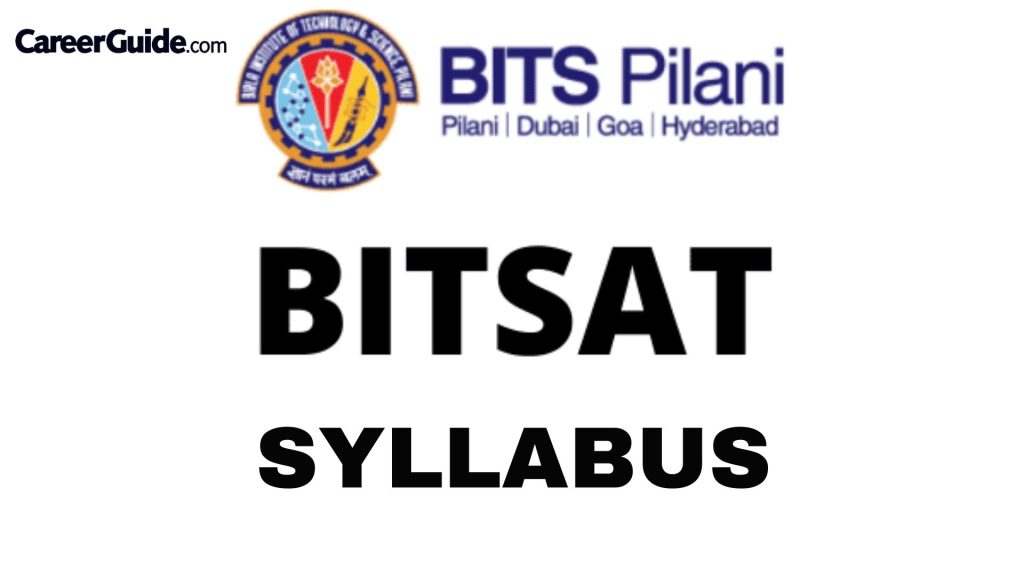BITSAT is a computer-based entrance exam conducted annually by the Birla Institute of Technology and Science (BITS) for admission to undergraduate engineering courses at its three campuses located in Pilani, Goa, and Hyderabad. The exam consists of multiple-choice questions from Physics, Chemistry, Mathematics/Biology, English Proficiency and Logical Reasoning.
BITSAT is a highly competitive exam, and the difficulty level is considered to be moderate to difficult. The exam duration is three hours, and there is a negative marking of 1 mark for each incorrect answer. The exam is conducted in multiple sessions, and candidates can attempt the exam multiple times to improve their scores.
BITSAT 2023 Highlights

Section | Topics Covered | Level ofDifficulty |
|---|---|---|
| Mathematics | 11 | Moderate to Difficult |
| Biology | 10 chapters from Class 11 and 12 CBSE syllabus | Moderate |
| Chemistry | 13 major topics, with most questions from chemical bonding and molecular structure followed by equilibrium and hydrocarbons | Moderate |
| Physics | 18 topics, with most questions from Current Electricity, Semi-Conductors, and laws of motion | Difficult |
| English & Logical Reasoning | English Proficiency (15 questions) and Logical Reasoning (10 questions) | Moderate |
The Mathematics section of the BITSAT exam covers 11 topics and is considered to be moderate to difficult in terms of difficulty level.
The Biology section of the exam covers 10 chapters from the CBSE syllabus of both Class 11 and 12. The topics from Class 11 hold more weightage than those of Class 12, with the maximum questions coming from principles of inheritance and variation, followed by molecular basis of inheritance and morphology of flowering plants.
The Chemistry section of the BITSAT exam consists of 13 major topics, with most of the questions coming from chemical bonding and molecular structure, followed by equilibrium and hydrocarbons
The Physics section of the exam comprises 18 topics and is considered to be one of the toughest thresholds by many aspirants. Most of the questions are asked from Current Electricity, Semi-Conductors, and laws of motion.
The English & Logical Reasoning section of the exam is subdivided into two more sections: English Proficiency and Logical Reasoning. This section consists of 15 questions from English Proficiency and 10 questions from Logical Reasoning.
BITSAT 2023 Syllabus
Section | Topics |
|---|---|
| Physics | Units & Measurement, Kinematics, Newton’s Laws of Motion, Impulse and Momentum, Work and Energy, Rotational Motion, Gravitation, Mechanics of Solids and Fluids, Oscillations, Waves, Electrostatics, Current Electricity, Magnetic Effect of Current, Electromagnetic Induction, Optics, Modern Physics, Electronic Devices |
| Chemistry | States of Matter, Atomic Structure, Chemical Bonding & Molecular Structure, Thermodynamics, Physical and Chemical Equilibria, Electrochemistry, Chemical Kinetics, Surface Chemistry, Hydrogen and s-block elements, p- d- and f-block elements, Principles of Organic Chemistry and Hydrocarbons, Stereochemistry, Organic Compounds with Functional Groups Containing Oxygen and Nitrogen, Biological, Industrial and Environmental Chemistry |
| Mathematics | Algebra, Trigonometry, Two-dimensional Coordinate Geometry, Three-dimensional Coordinate Geometry, Differential calculus, Integral calculus, Ordinary Differential Equations, Probability, Vectors, Statistics, Linear Programming, Mathematical modelling |
| English Proficiency & Logical Reasoning | Grammar, Vocabulary, Reading Comprehension, Composition, Verbal Reasoning, Nonverbal Reasoning |
BITSAT 2023 Exam Pattern
Subject | Questions |
|---|---|
| Physics | 30 |
| Chemistry | 30 |
| Mathematics/Biology | 40 |
| English Proficiency & Logical Reasoning | 20 |
| Total | 130 |
Some Additional Tips:
- Candidates who finish the initial test in the allotted three hours will have the opportunity to attempt 12 further questions.
- Three questions from each of the following four subjects—Physics, Chemistry, Mathematics/Biology, and Logical Reasoning—will make up the additional questions.
- Any or all of the additional 12 questions are available for the candidates to tackle.
- The additional questions will be graded according to the same criteria as the standard questions.
Best Books for BITSAT 2023 Preparation
Here are some of the best books for BITSAT 2023 preparation:
Subject |
Book |
|---|---|
| Physics | Concepts of Physics by H.C. Verma, Arihant BITSAT Physics by D.C. Pandey |
| Chemistry | Organic Chemistry by Solomons and Fryhle, Concepts of Physical Chemistry by K.L. Chhibber |
| Mathematics | R.D. Sharma, Arihant BITSAT Mathematics by M.L. Agarwal |
| English | The Complete Guide to BITSAT English by One Learner Education, Objective General English by R.S. Agarwal |
| Logical Reasoning | Shortcuts in Reasoning by Disha Experts, How to Prepare for Logical Reasoning by Arun Sharma |
FAQs On BITSAT Syllabus 2023
Physics, Chemistry, Mathematics/Biology, English Proficiency, and Logical Reasoning are among the subjects covered in the BITSAT 2023 syllabus. For a full syllabus, candidates should consult the official BITSAT 2023 brochure.
Yes, for Physics, Chemistry, and Mathematics, the BITSAT syllabus is comparable to the JEE Main syllabus. However, JEE Main does not assess English Proficiency or Logical Reasoning; these topics are included in BITSAT.
No, NCERT is insufficient for BITSAT prep. While the fundamentals of Physics, Chemistry, and Mathematics are covered in NCERT textbooks, BITSAT requires a deeper comprehension of these ideas as well as strong problem-solving abilities.
Yes, BITSAT does use negative marking. One point will be subtracted for each unsatisfactory response. However, there won’t be any points removed for unanswered questions.
No, 300 on the BITSAT is not a secure score. The number of applicants who take the test and their results determine the BITSAT cutoff, which changes every year. The Pilani campus’s Computer Science and Engineering (CSE) programme had a 377-point cutoff in 2022. Therefore, it is unlikely that a score of 300 will get you a spot at a top BITS college.
 60 minutes of Duration
60 minutes of Duration 100 Questions
100 Questions Instant Report
Instant Report 4 Dimensions
4 Dimensions 500+ Career Options
500+ Career Options 1M+ Test Taken
1M+ Test Taken




